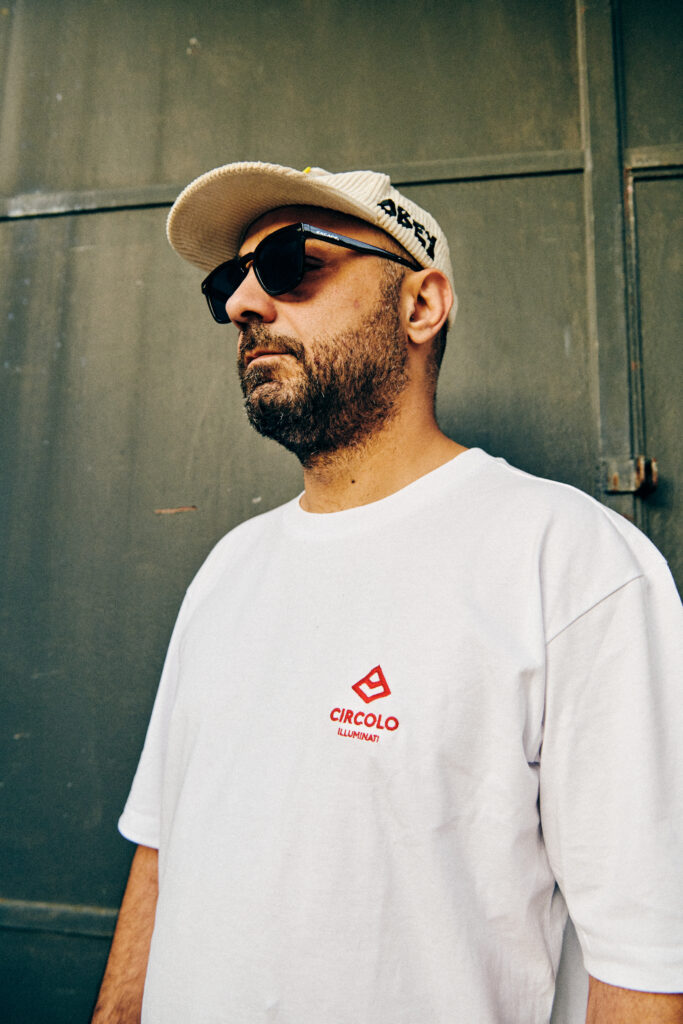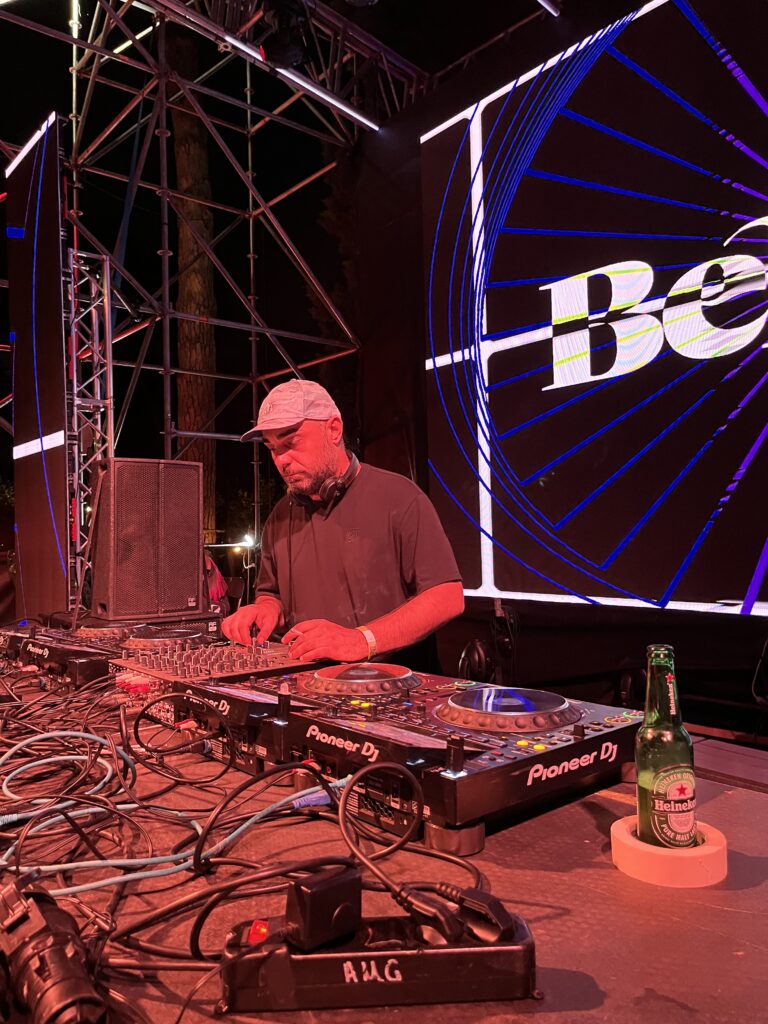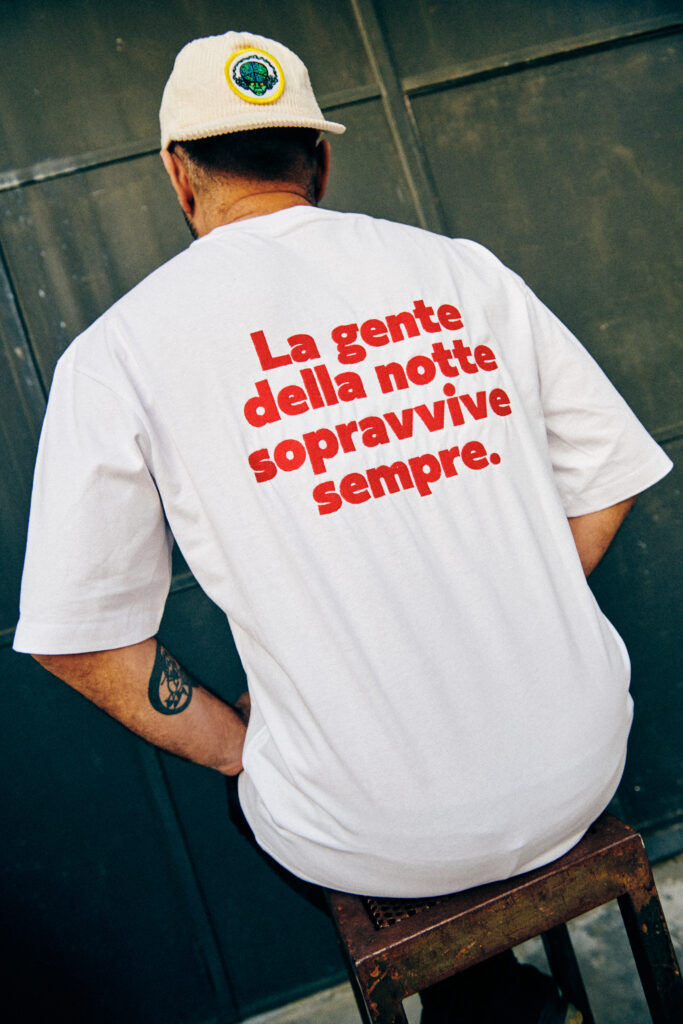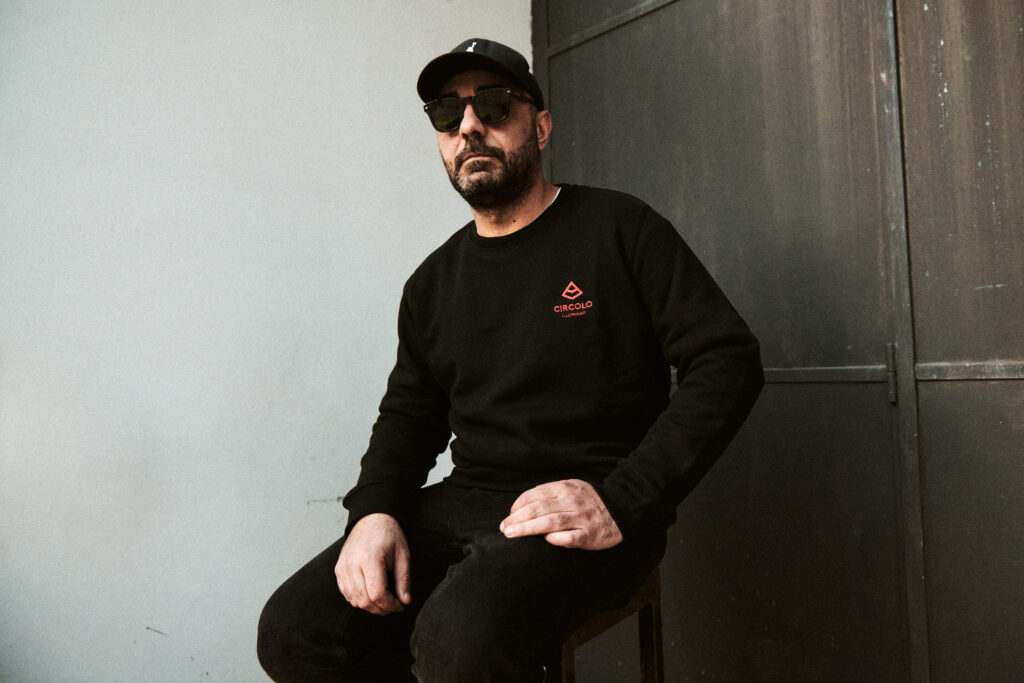Uno dei dj più affermati della scena romana ci racconta la storia della sua carriera, di Howl Records e del mondo della notte.
Germano Ventura, storico dj resident del party Minù al Circolo degli Illuminati, da molti anni fa ballare i giovani di Via Libetta. Appassionato e amante della musica, inizia la sua carriera da giovanissimo sperimentando sonorità minimali e scure, acquisendo una tecnica sopraffina.
Da subito si avvicina alla musica, iniziando a spostarsi e a frequentare locali, rimanendo folgorato dalla magia dei club. Decide di diventare dj in giovanissima età, facendo girare il suo nome prima nelle discoteche romane, successivamente in quelle di tutta Italia, fino ad arrivare ai palchi più importanti del mondo.

Germano Ventura – credit Nero Studio
Una carriera quella di Ventura che si basa principalmente sul suo gusto minimale, per le sue produzioni eccellenti e la sua abilità nel mix. Da anni questo dj fa ballare migliaia di persone, grazie ad un bagaglio musicale elettronico ricchissimo. Con lui abbiamo avuto l’opportunità di scambiare qualche battuta sulla sua carriera, sul mondo della notte e sulla storia della scena romana.
Dj e produttore appassionato, sei un punto fermo nella scena capitolina. Ti andrebbe di raccontarci come è nata la tua carriera e come si è sviluppata nel tempo?
Diciamo che l’amore per il club è nato a 11 anni quando ho cominciato a vivere i party di pomeriggio. Ricordo il Piper, l’Alien e l’Alpheus: erano quelli che frequentavo di più. A 14 ho cominciato a prendere i primi treni, anche senza biglietto, per andare a Riccione. La passione per la musica penso sia stata ereditata dalla mia famiglia; mia madre è professoressa di musica, ho degli zii musicisti e anche un direttore d’orchestra. A 15/16 anni dopo una serata al Cocoricò, tornando a casa, ho pensato che volevo fare il dj, e da lì tutto è iniziato.

Germano Ventura @BeHave – Eur Social Park – Roma – Credit Riccardo Vittore
Ho iniziato con un giradischi a cinghia e un compact disc. Con il compact mettevo play e col piatto a cinghia gli andavo dietro, da quel giorno in poi è stata un’escalation. I primi passi come dj li ho fatti quando ero ancora minorenne, in un club dell’Abruzzo, perche a Roma non era permesso, non era proprio fattibile. Però questo club ospitava 3000 persone. Iniziai facendo le chiusure e non ti nego che ci voleva coraggio. Non c’erano ancora i CDJ, non c’erano i mixer con gli effetti, c’erano i mixer da studio, era tutta un’altra storia.
Era anche più difficile credo.
Si era più difficile, ma all’epoca era quello. Io avevo imparato a mettere i dischi da Freddy K, da Zerla (Paolo Zerletti). Mi ricordo bene che se non riuscivi a mettere un disco con il motore acceso e l’altro disco a motore spento in reverse (che doveva andare a tempo), non eri considerato un dj. Cosa che oggi non riuscirei neanche più a fare, davvero difficile. Però quello era l’addestramento.
Poi, subito dopo i 18 anni, sono andato a Barcellona e a Ibiza un’estate intera, da solo con lo zainetto in spalla e la borsa dei dischi. Ho iniziato a suonare nelle salette dello Space durante la serata di Carl Cox “Angels of Love”, grazie a Paco S che aveva sentito uno dei miei CD.

Germano Ventura – credit Nero Studio
Tornato a Roma ho iniziato a inserirmi nel giro che mi piaceva. Da quel momento in poi non mi sono più fermato, e ci ho messo tutta la passione del mondo. A Roma non era facile, non era comune fare il dj, sicuramente molto distante dalla realtà di oggi, dove in ogni palazzo ce n’è uno. Inoltre era economicamente complesso, i dischi costavano caro ed ero costretto a fare dei lavoretti con i quali mi pagavo la musica.
Nella scena romana eravamo sempre gli stessi e spesso giravamo nei vari locali. Mi ricordo che all’inizio c’erano anche pochi ospiti, perché gli aerei erano un lusso. Si proponevano quasi sempre artisti italiani, che secondo la mia visione era anche meglio, in quanto ci reputo i migliori davanti al mixer. In Italia abbiamo grandi maestri del mixaggio, come Francesco Farfa, Montanari, Dj Ralf, grande fonte d’ispirazione.
A livello cronologico sappiamo che nel 2011 inizia la tua carriera da produttore, nel 2013 la residenza al Circolo degli illuminati di Roma e nel 2015 arriva HOWL Records (in collaborazione con Giovanni Verrina). Ti andrebbe di raccontarci cosa è cambiato nella tua musica e nella tua vita da dj dopo più di dieci anni di attività?
La mia carriera da produttore inizia con un progetto chiamato “micro_on” con Adriano Moretti, e la prima produzione uscì su Clack Music. Uno di questi dischi piacque molto a Marco Carola, motivo pero il quale poi uscì una mia produzione su Safari Electronique. Quella fu una grande soddisfazione personale.
Ricordo che per imparare ad utilizzare la griglia, dato che non c’erano tutorial su YouTube, ci misi una settimana. Da li poi ho iniziato, grazie all’avanzamento della tecnologia, ad approcciarmi alla strumentazione modulare, sperimentando nel 2011 i suoni minimali. Volevo registrare suoni unici e irripetibili, utilizzando sì i soliti macchinari, ma volevo collezionare pattern da inserire su Reaktor o su altre macchine. Probabilmente il sound che proponevo era un po’’ aggressivo per quel periodo, forse il pubblico non era ancora pronto, per questo ebbi difficoltà a suonare nei vari club.
Subito dopo ho raccolto i frutti del mio lavoro, avendo io iniziato a produrre prima di affermarmi come dj, mettendoci tutta la passione che avevo. Si può dire che la mia fortuna è stata quella, ero già dentro l’epoca del dj/produttore, perché avevo iniziato a produrre per passione più che per motivi lavorativi. Inizialmente pubblicavo la mia musica su All-In Records, ma anche su tante altre etichette come Nerv Music che erano comunque label che seguivo molto, per questo è stata una grande soddisfazione. Quella è stata una bella fase della mia carriera musicale, mandavamo molta musica in giro per le varie etichette, e il 99% delle volte veniva pubblicata. In quel periodo abbiamo fatto molti showcase in giro per l’europa, scoprendo molte piste e nuove dinamiche.
Aprire Howl Records è stata un’altra grande soddisfazione. Uno dei motivi principali per cui abbiamo fondato questa label era avere completa liberta nella selezione della musica da pubblicare. Spesso le etichette che pubblicavano la nostra musica selezionavano poche tracce e solitamente quelle meno articolate, per questo motivo volevamo essere indipendenti. Con Giovanni (Verrina, ndr) abbiamo sempre lavorato insieme e selezionato musica insieme, per questo avevamo il desiderio di lavorare su qualcosa che fosse completamente nostro.
Con Giovanni hai sempre avuto un buon rapporto personale e lavorativo?
Assolutamente sì, da sempre. È nato tutto per caso. Nel 2011 mi chiamò per suonare in una data che dovevo recuperare, e ci ritrovammo io e lui a fare B2B per 5 ore e musicalmente ci siamo trovati benissimo.
Dopo tanti anni di lavoro insieme pensi sia cambiato qualcosa?
Beh dopo la pandemia è cambiato tutto, anche musicalmente parlando. Dopo quel periodo, i suoni minimali che proponevamo sono un po’ spariti, e gli ascoltatori e il pubblico sono cambiati. Quello che stiamo cercando di fare oggi è principalmente proporre musica fresca, per i giovani e prodotta da giovani. Tutti i giorni selezioniamo tantissima musica, soprattutto proponendo ragazzi che non avevano mai pubblicato un disco prima d’ora.

Germano Ventura – credit Nero Studio
Sei un’artista fortemente affermato sul territorio romano, ma non solo. Spesso il tuo nome appare all’interno delle programmazioni dei migliori club di tutta Italia, a fianco dei più importanti dj del momento. Ti andrebbe di condividere con noi le tue esperienze, le tue prospettive e visioni in merito?
Sicuramente Roma è sempre stata e sempre sarà la mia palestra. Roma ha un pubblico che ti allena bene e che ti prepara ad ogni evenienza. La differenza con l’estero è che nel nostro paese tutto si svolge in pochissimo tempo, dato che gli orari di attività dei club sono davvero ristretti. È difficile costruire un percorso musicale in poco tempo, in quelle 2 ore devi offrire il massimo e cercare di divertire al massimo. Io sono molto affezionato alla scena dell’est: le vibrazioni e le situazioni che si creano, mi piacciono molto.
I rapporti che ho coltivato negli ultimi anni sono solidi e mi danno grandissima gioia. Il Circolo degli Illuminati, il Muretto, After Caposile sono solo alcuni dei club con cui io ho un legame forte. Il grande peccato è che in Italia negli ultimi anni si è persa la scena che c’era prima, e la verità è che mancano i club. Il mondo è cambiato, soprattutto nell’ambito dei dj. Oggigiorno si guarda più alla facciata e alla popolarità invece di porre l’attenzione sulla qualità artistica. Tutto questo non fa per me, io ho sempre preferito concentrarmi sulla potenza e qualità delle produzioni.
Germano Ventura @Muretto – 02.09.2023
La tua selezione e il tuo suono hanno conquistato una fiducia netta da parte del pubblico, che ti ha permesso di risultare credibile e originale. Il lavoro svolto è stato eccellente, ti andrebbe di raccontarci quali saranno le future mosse di Germano Ventura?
Seleziono musica tutti i giorni per diverse ore al giorno, ma credo che la mia forza sia il mixaggio. Cerco sempre di far divertire il pubblico, divertendomi io stesso, giocando molto con un mix a doppio canale, rendendo le cose sempre movimentate. Voglio sempre di spaziare nella proposta musicale durante un mio set. Ogni 2/3 tracce inserisco un pezzo che differisce dagli altri, cerco di innovare sempre e di mantenere alta l’attenzione di chi mi ascolta.
Dalle mie origini house, che fanno sempre parte di me e del mio lavoro, fino ad arrivare oggi al mio sound minimale posso affermare di avere un bagaglio musicale davvero ampio, che mi permette di variare moltissimo durante i miei set. A livello di produzioni questo 2023 è stato ricco di remix, ho lavorato su un EP di Flavio Vecchi, un artista che mi piace molto musicalmente e che ha pubblicato sulla nostra etichetta “Lagare“. Ho lavorato su un remix di Zeleke, altro giovane ragazzo di Parigi che secondo me farà belle cose in futuro. A breve uscirà un altro mio singolo su Howl Records, insomma un sacco di lavoro.
Da anni collaboro con Melania Bertano del Circolo degli illuminati, lascio curare a lei tutto l’aspetto delle serate dove suono. Spero davvero di riuscire a tornare nel panorama estero, stiamo lavorando proprio per far si che questo accada, in quanto sono molto legato a diversi club oltre confine dove vorrei tornare a suonare.
Trovi tutte le nostre interviste QUI nella sezione dedicata del nostro sito.
ENGLISH VERSION
A passionate DJ and producer, you are a staple in the Capitoline scene. Would you like to tell us how your career started and how it has developed over time?
Let’s say that the love for the club was born at the age of 11 when I started to experience the afternoon parties. I remember the Piper, the Alien and the Alpheus: they were the ones I frequented most. At 14 I started taking the first trains, even without a ticket, to go to Riccione. I think my passion for music was inherited from my family; my mother is a music teacher, I have uncles who are musicians and also an orchestra conductor. When I was 15/16 years old after an evening at Cocoricò, on my way home, I thought I wanted to be a DJ, and that’s when it all started.
I started with a belt-drive turntable and a compact disc. With the compact I would play and with the belt-drive turntable I would go after it, from that day on it was an escalation. I took my first steps as a DJ when I was still a minor, in a club in Abruzzo, because in Rome it wasn’t allowed, it just wasn’t feasible. But this club had 3000 people. I started by doing the closures and I won’t deny that it took courage. There were no CDJs yet, there were no mixers with effects, there were studio mixers, it was a different story.
It was even harder I think.
Yes it was more difficult, but that was it at the time. I had learnt how to put the discs on from Freddy K, from Zerla (Paolo Zerletti). I remember well that if you couldn’t put one record on with the engine on and the other record off in reverse (which had to be in time), you weren’t considered a DJ. Which I couldn’t even do today, really hard. But that was the training.
Then, right after I turned 18, I went to Barcelona and Ibiza for a whole summer, alone with my backpack on my shoulder and my record bag. I started playing in the rooms of Space during Carl Cox’s ‘Angels of Love’ night, thanks to Paco S who had heard one of my CDs.
Back in Rome, I started to get into the business I liked. From then on I never stopped, and I put all the passion in the world into it. In Rome it was not easy, it was not common to be a DJ, certainly a far cry from today’s reality, where there is one in every building. Besides, it was economically complex, records were expensive and I was forced to do odd jobs with which I paid for my music.
In the Roman scene we were always the same and we often toured the various clubs. I remember that in the beginning there were also few guests, because planes were a luxury. We almost always had Italian artists, which in my view was even better, because I thought we were the best in front of the mixer. In Italy we have great masters of mixing, like Francesco Farfa, Montanari, Dj Ralf, a great source of inspiration.
Chronologically speaking, we know that in 2011 you started your career as a producer, in 2013 your residency at Circolo degli illuminati in Rome and in 2015 HOWL Records arrived (in collaboration with Giovanni Verrina). Would you like to tell us what has changed in your music and in your life as a DJ after more than ten years?
My career as a producer started with a project called ‘micro_on’ with Adriano Moretti, and the first production came out on Clack Music. Marco Carola liked one of these records very much, which is why a production of mine was then released on Safari Electronique. That was a great personal satisfaction.
I remember that it took me a week to learn how to use the grid, since there were no tutorials on YouTube. From there I then started, thanks to the advancement of technology, to approach modular instrumentation, experimenting with minimal sounds in 2011. I wanted to record unique and unrepeatable sounds, yes using the usual machines, but I wanted to collect patterns to put on Reaktor or other machines. Probably the sound I was proposing was a bit aggressive for that time, maybe the audience wasn’t ready for it yet, that’s why I had difficulties playing in various clubs.
Immediately afterwards I reaped the benefits of my work, having started producing before establishing myself as a DJ, putting all the passion I had into it. You could say that was my luck, I was already in the DJ/producer era, because I had started producing out of passion rather than for work reasons. I was initially releasing my music on All-In Records, but also on many other labels like Nerv Music, which were labels I followed a lot anyway, so that was a great satisfaction. That was a good phase of my music career, we used to send a lot of music around to the different labels, and 99% of the time it was released. During that time we did a lot of showcases around Europe, discovering a lot of tracks and new dynamics.
Opening Howl Records was another great satisfaction. One of the main reasons we started this label was to have complete freedom in the selection of music to release. Often the labels that released our music selected only a few tracks and usually the less articulate ones, which is why we wanted to be independent. With Giovanni (Verrina, ed.) we always worked together and selected music together, so we wanted to work on something that was completely our own.
Have you always had a good personal and working relationship with Giovanni?
Absolutely yes, always. It all started by chance. In 2011 he called me to play on a date I had to make up, and he and I ended up doing B2B for five hours, and musically we got on really well.
After so many years of working together do you think anything has changed?
Well after Pandemic everything changed, even musically speaking. After that period, the minimal sounds we used to offer have disappeared a bit, and the listeners and the audience have changed. What we are trying to do today is mainly to propose fresh music, for young people and produced by young people. Every day we select a lot of music, especially by proposing young people who have never released a record before.
You are a strongly established artist in the Rome area, but not only. Your name often appears in the programming of the best clubs throughout Italy, alongside the most important DJs of the moment. Would you like to share with us your experiences, perspectives and visions in this regard?
Certainly Rome has always been and always will be my gym. Rome has a public that trains you well and prepares you for every eventuality. The difference with abroad is that in our country everything takes place in a very short time, as the club hours are really tight. It is difficult to build a musical path in a short time, in those 2 hours you have to offer your best and try to entertain as much as possible. I am very fond of the eastern scene: the vibes and the situations that are created, I like them a lot.
The relationships I have cultivated over the last few years are solid and give me great joy. Circolo degli Illuminati, Il Muretto, After Caposile are just some of the clubs with which I have a strong connection. The great pity is that in Italy in recent years the scene that was there before has been lost, and the truth is that there is a lack of clubs. The world has changed, especially in the DJ sphere. Nowadays people look more at the façade and popularity instead of focusing on artistic quality. This is not for me, I have always preferred to focus on the power and quality of productions.
Your selection and your sound have won a clear trust from the public, which has allowed you to be credible and original. The work done was excellent, would you like to tell us what Germano Ventura’s future moves will be?
I select music every day for several hours a day, but I think my strength is the mixing. I always try to entertain the audience, having fun myself, playing a lot with a dual channel mix, always making things lively. I always want to range the music during one of my sets. Every 2/3 tracks I put in a track that differs from the others, I always try to innovate and keep the listener’s attention.
From my house origins, which have always been a part of me and my work, to my minimal sound today, I can say that I have a really wide musical background, which allows me to vary a lot during my sets. In terms of productions this 2023 has been full of remixes, I worked on an EP by Flavio Vecchi, an artist I like very much musically and who has released on our label ‘Lagare’. I worked on a remix by Zeleke, another young guy from Paris who I think will do good things in the future. Another single of mine will be released soon on Howl Records, in short a lot of work.
For years I’ve been collaborating with Melania Bertano of Circolo degli Illuminati, I let her take care of the whole aspect of the evenings where I play. I really hope to be able to return to the foreign scene, we are working to make this happen, as I am very close to several clubs across the border where I would like to return to play.
